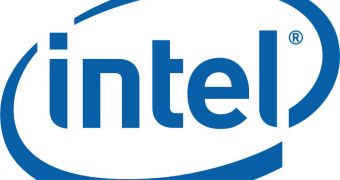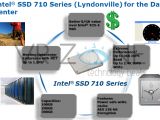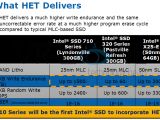In the next few weeks, Intel is expected to unveil a new generation of 2.5-inch solid state drives for the enterprise environment code named “Lyndonville,” the detailed specifications of these SSDs just making their way to the Web.
The 710 Series “Lyndonville” enterprise solid state drives are meant to replace Intel's current X25-E SSDs and are built to use 25nm HET MLC Flash in comparison with the 50nm SLC NAND of their predecessors, which helps them deliver higher storage capacities at lower price points.
They will use the same SATA 3Gbps interface as the X25-E series, but, this time, Intel has paired the SSD controllers with 64MB of DRAM cache.
Lyndonville SSDs will be able to achieve sequential read/write speeds of 270MB/s and 210MB/s respectively, while their 4K random read/write performance is rated at 36K/2.4K IOPS (input/output operations per second).
While these speeds aren't a huge improvement over those achieved by the X25-E (the X25-E actually beats the upcoming drives when it comes down to 4K random writes), the 710 Series sports an advanced set of features.
This list includes additions like AES 128-bit hardware encryption, power safe write cache, a temperature sensor and an in-rush current limiter.
Endurance varies depending on the size of the drive and on the provisioning space used, and goes from 500TB in the 100GB SSD to 1.3PB in the 200GB unit with 20% over-provisioning.
In the case of the top of the line 300GB solid state drive, 4KB write endurance is raised even further, to reach 1.5PB.
According to some previous information, pricing for the drives is expected to start at €554.50 for the 100GB unit, while the 200GB and 300GB SSDs will retail for about €1108.99 and €1663.50, respectively. (via VR-Zone)

 14 DAY TRIAL //
14 DAY TRIAL // 


